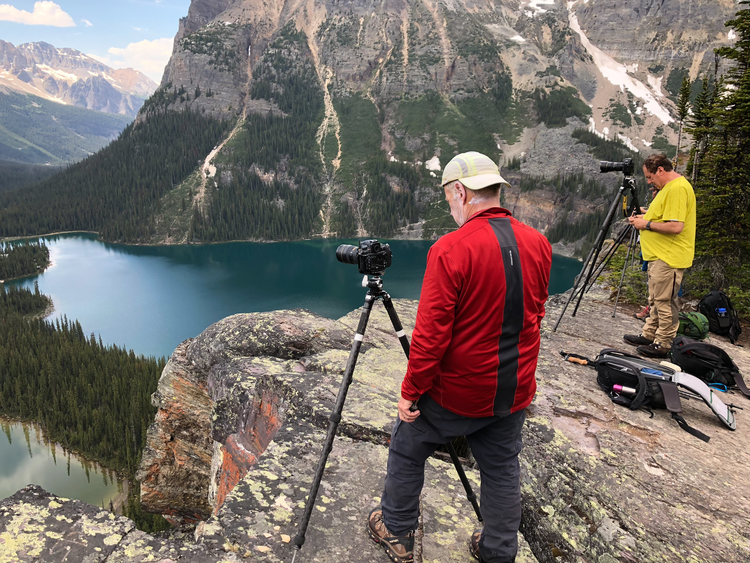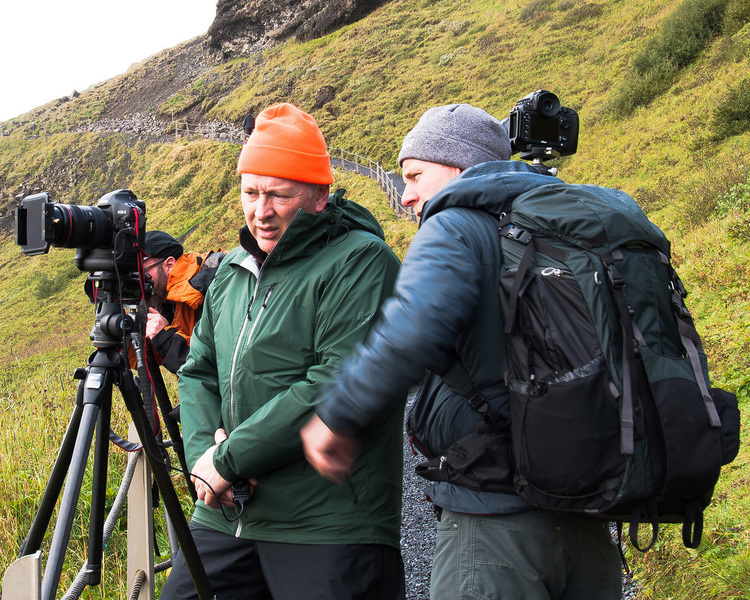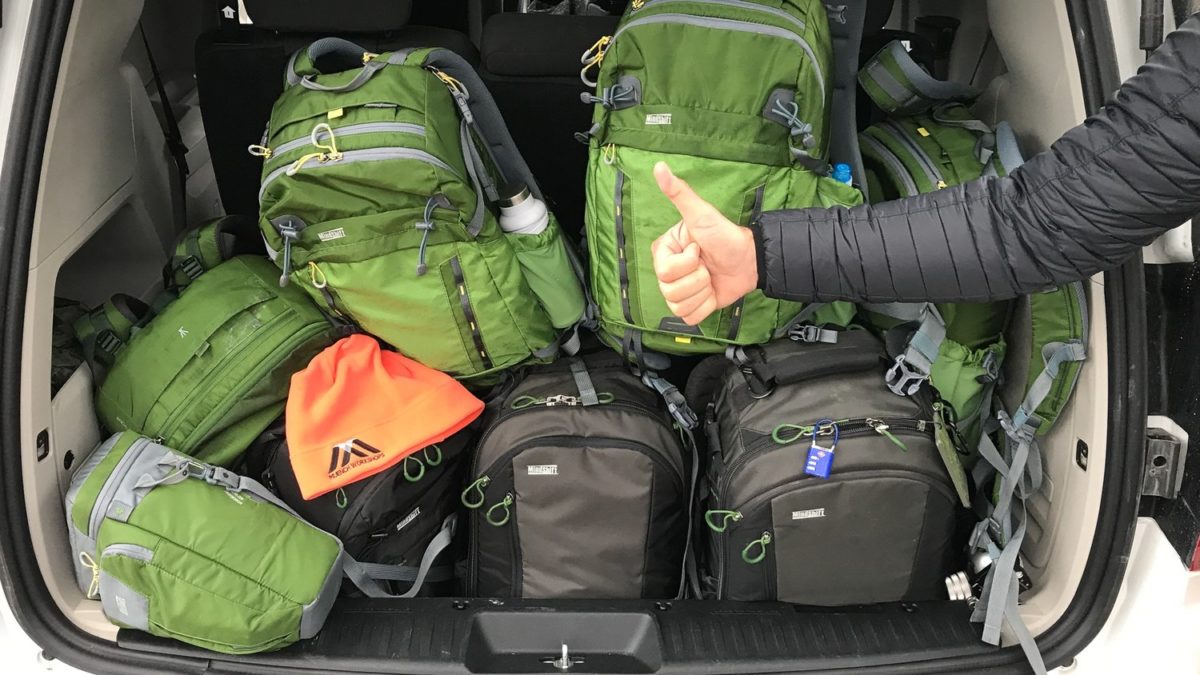
Our workshops are instructional, fun, and challenging. And while we’re busy preparing to provide you with a fantastic experience, you also need to prepare so that you can make the most of our time together. This means that you are ready for the physical demands of the workshop, you are comfortable with operating your camera, and that you have all the necessary camera gear and clothing. If you need help, we’re easy to reach!
Fitness

The fitness level for our workshops varies significantly. The altitude, terrain, and distances hiked can range from very easy to very challenging. It’s critical that you are honest with yourself and us about your current abilities and that you train, if necessary, to prepare for the workshop. We are always available for any questions or concerns you may have, and we’ll do our best to help you prepare. But ultimately it is your responsibility to ensure that you are up to the challenges of the workshop. If we don’t know you yet, be prepared for our very thorough questions about your physical abilities.
Know your camera

The single best way to get more bang for your buck on our workshops is to know your camera. Time spent in the field struggling with camera settings is time you can’t spend on improving your photography and is a sure-fire way to miss shots. For some of you, this is “basic stuff” and for others it’s wise to run through each item carefully and make sure you can really do all these things. For everyone, the workshop you’re about to go on is not the time to be using your new camera system for the very first time, so be sure to allow time for practice. We’re going to employ all of these skills with you so that you can make great images!
For all of your camera systems, you should be able to:
✔️ Select the aperture, shutter speed and ISO values in manual mode and use these dials fluently.
✔️ Be able to use Aperture Priority and Shutter Priority modes, and also to adjust exposure compensation.
✔️ Change the number of focus points from multipoint to single point and know how to move it around the viewfinder and live view.
✔️ Change the focus method from single shot to continuous, and from auto focus to manual focus.
✔️ Display the live view histogram (if the camera offers one) and/or exposure metering in live view.
✔️ Display the electronic level/virtual horizon and gridlines in live view.
✔️ Display the RGB histogram in image playback.
✔️ For mirrorless cameras, turn on focus peaking.
✔️ Find and set Auto ISO settings and options.
✔️ Set a 2, 5, or 10-second self-timer. This is very useful to reduce camera shake if you don’t have a remote trigger.
✔️ For DSLR shooters, activate live view and easily zoom in for critical focus. If you only use live view, then also make sure you’re comfortable with using the viewfinder.
✔️ Be comfortable enough with these settings that you can do all of them in the dark. We often shoot in the dark!
Gear and Packing
✔️ Make sure your laptop operating system software is updated.
✔️ Update Lightroom Classic and Adobe Photoshop. Make sure you log out of Adobe and log back in, before leaving, so that your versions are good for offline use for 30 days. Do the same with any other software you use for processing.
✔️ Pack your gear so that your go-to lens is handy and ready to go. Consider storing that lens on the camera body.
✔️ Make sure your lenses and sensors are clean.
✔️ Check for, and apply manufacturer firmware updates to your camera bodies and lenses.
✔️ Check the recommended gear list for your workshop, talk to your pro, and ask questions so that you don’t over or under pack.
✔️ Double check that you have all cords, adapters, and other accessories that you’ll need during the workshop. Consider bringing a small travel power strip.
✔️ Pack all of your lithium batteries in your carry-on bag, so that you are complying with flight regulations. Consider using Lipo Safe Bags.
✔️ Make sure to set the date and time of your cameras to local time.
✔️ Set your camera so it will only fire with a memory card in the slot. You never know when you might forget to put the card back in the camera, and the last thing you want is to find out later that all those “shots” you took weren’t saved.
✔️ Pack in soft-sided luggage. It packs into our vehicles better than hard plastic luggage.
✔️ Pack all prescription medication, supplements, and eyeglasses/contacts in your carryon bag. Bring along a supply of over-the-counter medicines that you might need such as cold medicine, antihistamine, anti-diarrheal medicine, antacids, pain relievers, and similar products.
Clothing and weather gear
While you don’t want to overpack, it’s always good to assume that it will be colder, windier, and wetter than you expect. Wondering if you should bring your rain pants? Bring them. Extra set of gloves in case the first gets wet? Great idea. Maybe your socks get soaked in a stream or the surf of the ocean. Another layer? Yes. Be prepared for the unexpected.
Make sure your boots are properly fitted and broken in. Waterproof boots are best. For some workshops, a pair of shoes or sandals will be fine, too. Ask us if you have any questions about your footwear.

Be sure to check the information document we send you before each workshop for updates to these lists, and any additional requirements specific to your workshop
Required: A must for every workshop
✔️ STURDY TRIPOD
Consult with us if you don’t have one you’re thrilled with, and we can recommend the right one for your needs. Be sure you also have adjustment tools, if needed.
✔️ BALLHEAD AND CAMERA / LENS PLATES
For ballheads, we love the models from Really Right Stuff, as well as the Arca-Swiss p0 Monoball and the Acratech GXP ballheads . You’ll need ballhead plates for all of your various cameras and telephoto lenses (with collars), as well as the tools needed to install and remove them. We’re huge fans of Really Right Stuff L-brackets and plates.
✔️ CAMERA STRAP(S)
You can use what comes with your camera, or try something from BlackRapid or PeakDesign.
✔️ TWO CAMERA BODIES
Sony, Canon, Nikon, Panasonic, Olympus, Hasselblad, Fuji, or another—your choice. Why two? You’ll have a backup in case of accidental damage or electronic failure.
✔️ BATTERIES
Bring plenty of batteries for your cameras, and chargers as well. If your trip involves locations with limited electric power, you will want to bring a power bank to recharge your batteries.
✔️ LENSES
For most landscape and wildlife workshops, a wide-angle zoom (16-35, 17-35, 17-40), a general-purpose zoom (like 24-70 or 24-105), and a medium telephoto zoom (like 70-200) are just perfect. For some wildlife workshops, you’ll want something longer—at least 300mm, and likely 400mm or 500mm. Canon, Sony, and Fuji all make 100-400mm lenses that are great for wildlife. It’s quite fine to use the Sigma or Tamron 150-600 lens as well. Don’t own any of this glass? No worries— Lens Rentals to the rescue! They make renting easy, and with the code “MUENCHLENS15” at checkout, you’ll save 15% on every rental.
✔️ MEMORY CARDS
You’ll want to have plenty of these—ideally enough that you won’t have to format any while on the workshop. Don’t forget a card reader!
✔️ LAPTOP
We use and exclusively teach Lightroom Classic for post-processing, though you may also use other software programs. Once downloaded and installed, be sure you connect (via the internet) with Lightroom Classic and Photoshop. This will ensure you’ll be able to use them offline on your trip. Consider taking our online Lightroom Essentials course!
✔️ PLUG ADAPTERS
If you are traveling internationally, you will likely need adapters for your plugs.
✔️ LENS CLEANING CLOTH
We sent you one, so remember to bring it! We also love Zeiss Cleaning Wipes.
✔️ CAMERA RAIN COVER
Buy an inexpensive plastic one from Amazon or a more permanent one from LensCoat (10% off – use code “Muenchtravel23”) or ThinkTank.
✔️ BACKPACK
You’ll definitely want a comfortable camera backpack for carrying all of your gear. We love the bags from MindShift.
✔️ CAMERA MANUAL
Bring the manual for your camera! This is very important. TIP: get the PDF and store it on your smartphone.
✔️ BOOTS/SHOES
Sturdy, broken-in hiking boots or hiking shoes appropriate for the workshop. This is not the time for a brand new pair.
✔️ WATER BOTTLE
It is important that we all reduce our use of plastics.
Recommended: We always travel with these
✔️ EXTERNAL HARD DRIVE OR STORAGE DEVICE
Optional—but helps especially on longer trips. Your laptop typically doesn’t have enough space to store all of your files.
✔️ POWER STRIP
Hotel rooms don’t always have enough outlets, so bring a travel power strip. A travel extension cord can be handy, too.
✔️ FILTERS
We don’t use a lot of filters, but a circular polarizer (for cutting reflections) and a few ND filters (for long exposures) are always in our kit. For ND filters, we bring a 3- or 6-stop, and a 10-stop. We love NiSi filters and have a discount code to share if you contact us. Also, at Kase filters we have a 10% discount when you use the code 10Muench at checkout. We also usually have a supply of loaner filters available.
✔️ WIRED REMOTE TRIGGER
This is typically needed when using Bulb mode. We usually carry an intervalometer that does the remote trigger job and is great for time-lapse.
✔️ SUNSCREEN, BUG REPELLENT, MOSQUITO HEAD NET
Because you never know.
✔️ WIDE BRIM HAT
To ward off the sun, and helps you to see the camera LCD.
✔️ HEADLAMP
For night photography. It must have both red and white lights (preferably on separate switches), and be dimmable. We recommend one like this.
✔️ RAIN JACKET, BEANIE, NECK GAITER, GLOVES
We don’t travel anywhere without at least a light rain jacket, a beanie, a neck gaiter, and gloves for cold weather (especially cold nights!). The beanie and neck gaiter we send you are great, bring them.
✔️ BACKUP ID
For international trips, in case you lose your passport or driver’s license. A photo of your passport is a must, plus another form of ID like a birth certificate or driver’s license. You may also want to bring some printed passport photos.
✔️ WATERPROOF BOOTS OR OVERSHOES
Sometimes you want to stand in a stream.
✔️ SPIKES FOR YOUR BOOTS
Kahtoola MICROspikes (or similar) for wintry icy workshops, we’ll let you know if you need them.
✔️ SWIMSUIT
Hot tubs, swimming pools, streams, and lakes!
Optional: Nice to have, but your choice
✔️ SPECIALTY LENSES AND CAMERAS
Macro, tilt-shift, extreme wide angle lenses. Wide fast prime for night (star) photography. Go Pros or similar action cameras.
✔️ POCKET KNIFE / LEATHERMAN / RRS MULTI-TOOL
Be sure you don’t carry it on the plane!
✔️ SENSOR CLEANING SUPPLIES
Products by Visible Dust. Aeroclipse Fluid. Bulb blower (we sent you one).
✔️ LENS & CAMERA PROTECTION
We love what Lenscoat has to offer for protecting and camouflaging your gear. Use the code “Muenchtravel23” at checkout for 10% off.
✔️ KNEE PADS
So you can comfortably get down low.
✔️ TREKKING POLES
For added stability.
✔️ TRAVEL COFFEE/TEA MUG
If having your favorite drink nearby is important to you, carry one of these. We also love Starbucks Via!
We know this can be a lot to deal with. If you’ve got questions, we’re here for you anytime, just holler.

